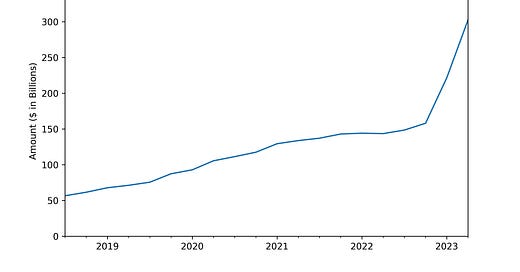Use of Reciprocal Deposits Doubles Over Previous Two Quarters as They Become Essential to Community and Regional Banks
September 12, 2023 | ModernFi Insights
Banks across the country are using reciprocal deposits in record numbers to attract and retain large-value depositors. The banking turmoil earlier this year, which amplified an already aggressive interest rate cycle, has caused uninsured deposits to leave the banking sector at speed. The runoff has disproportionately affected community and regional banks that have been more prone to depositor concerns about stability.
To attract and retain key large-value depositors, banks have turned to reciprocal products. In a reciprocal product, deposits are swept into a network of banks in increments of less than $250,000 in order to provide a depositor with extended insurance. Receiving banks reciprocate, or send back matching amounts, so that the originating institution does not lose deposits in aggregate.
Over the past two quarters, the use of reciprocal deposits has doubled, increasing an incredible 91% from $158bn to $302bn, by far an all-time high. However, the use of reciprocal deposits is still far lower than the $4.8tn of uninsured deposits held outside of the largest four institutions, suggesting their growth will likely continue.
While reciprocal products have existed for nearly two decades, their rapid expansion hints that they are now becoming an essential product for all community and regional banks. In May, the FDIC stated that, “although larger, institutional depositors are better equipped than smaller depositors to perform due diligence, they may also use their resources to expand their deposit insurance coverage beyond the $250,000 limit by using deposit services such as brokered deposits, reciprocal deposits, and sweep accounts”, providing a green light for their use.
Not surprisingly given our business, we strongly believe reciprocal products will continue to grow in importance and prevalence over the coming quarters. They provide a non-rate value proposition to attract and retain key clients, they provide a beautiful security benefit to depositors, and they stabilize a bank’s deposit base. However, the high-friction depositor experience of current reciprocal programs must be improved for them to become the default product for large-value depositors, something that we are hard at work on.
Best,
The ModernFi Team
Current rates
Change from three weeks ago
Sources: FHLB Advances are an average of FHLB Boston, FHLB Chicago, and FHLB Des Moines. Brokered CDs are an average of Fidelity and Vanguard. Listed CDs provided by National CD Rateline. US Treasurys provided by WSJ. SOFR provided by CME. Deposit data provided by the FFIEC Call Reports.





